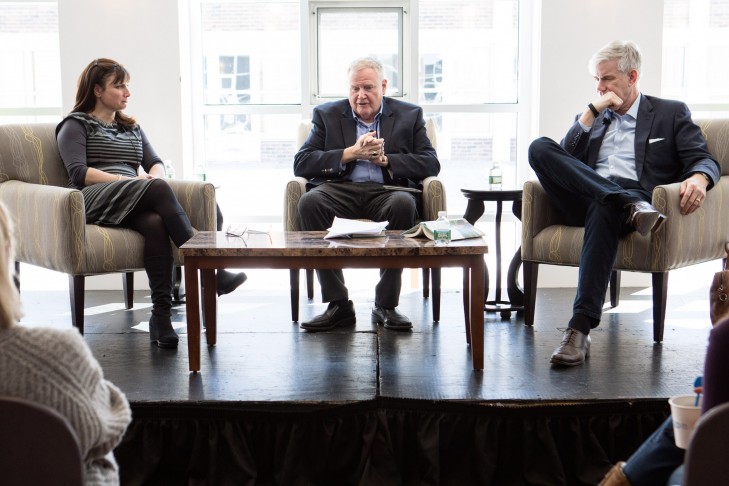There was an emotional moment for David Gregory during a public, 90-minute conversation yesterday at Congregation Mishkan Tefila in Chestnut Hill, in which he said through tears that he felt more Jewish today than at any other time in his life: “I’m not seeking God in a generic way, but to know God through Jewish ritual, through community.”
Gregory, a former White House correspondent for NBC and one-time moderator of “Meet the Press,” openly discusses his personal faith and interfaith marriage in his memoir, “How’s Your Faith? An Unlikely Spiritual Journey.” Published last fall, the title came from a question that former President George W. Bush posed to him. A review in The Washington Post called his response in the book “a thoughtful, introspective, and moving account of Gregory’s life, family, and beliefs, including his struggles with his mother’s alcoholism, with interfaith marriage, with anger, with God.”
Gregory’s thoughtful introspection, particularly on his interfaith marriage to Beth Wilkinson and their decision to raise their children as Jews, was evident in yesterday’s conversation with Erica Brown, CJP’s scholar-in-residence, and CJP president Barry Shrage, who moderated. Brown herself is the author of 10 books, the latest of which is, “Take Your Soul to Work: 365 Meditations on Every Day Leadership.” A Modern-Orthodox scholar, she has also been Gregory’s long-time tutor on his quest to live a more spiritual and observant Jewish life. “David,” said Brown, “wanted to be a literate Jew. He wanted to meet a variety of denominations.” Brown was open in her approach to Gregory’s studies. Those studies, Gregory asserted, “led me to a more halachic [Jewish religious law] path.” He began experimenting with wearing tefillin, but then stopped to go back and study the significance of the ritual.
Gregory came to his Judaism as the son of a Jewish father and an Irish-Catholic mother. He began his life as a cultural Jew, and along the way sought a more spiritual and religious path for himself. As Gregory described the result: “I’m Jewish not just because I’m Jewish and I chose Judaism. Judaism has chosen me.”
As important as Brown’s teaching was for his spiritual growth, Gregory’s wife, who maintains her own Christian faith, continually challenged him to think more deeply about his Judaism. Of her role, he said: “It was important to give room to my wife’s religious traditions. But we also had to make [Judaism] broad enough to include her, while having the gift of a Jewish family.”
For example, Gregory noted that while Wilkinson “felt the power” of their son’s bar mitzvah service, she was also somewhat on the periphery of the ceremony. Gregory told the audience of 70 or so at Congregation Mishkan Tefila that Wilkinson had felt excluded as a woman and a non-Jew. But even with that tension, Gregory described his son’s bar mitzvah as “an incredible moment of Jewish ethnic integrity. It was a l’dor, v’dor [generation to generation] moment of ritual observance.” That moment was made all the more poignant and bittersweet when Gregory gave his son the siddur, or prayer book, his father had given him. His father, who died a week before his grandson’s bar mitzvah, inscribed in the front page of the book his wish to see a grandchild receive it.
All three participants in the conversation meaningfully grappled with Gregory’s dilemma of “creating a portal for interfaith couples who want to pursue a Jewish life that includes both spouses in a meaningful way.” Gregory cited that since 2000, the year he and Wilkinson were married, 50 percent of American Jews have married a non-Jewish spouse. “How can we make this work in a way that preserves the base and a vibrant Jewish life?” he asked.
On the issue of inclusivity and interfaith families, Brown asserted: “Peoplehood and tribalism is a nice welcome mat, but it’s not deep enough. [Interfaith couples] are asking us to push on them, to do what Beth did for David. ‘What is this about for you? How do you earn your Judaism?’ For me it’s about belief. What do I believe and how do I grow it?”
For Gregory a moment of evolution in his interfaith marriage came when Wilkinson saw how much he thought about taking on the observance of more rituals. “She appreciated the real growth and the deeper grounding of a religious life,” he said. “She now realizes that I’m not just grabbing onto ways to be more Jewish, and she respects that integrity.”
Gregory is grateful for the ways in which his wife and his teacher have been so present for him on his religious journey. “Beth challenged me and Erica took my hand and went down a beautiful path with me. My Jewish identity is a source of great pride and great emotion. The more I seek a divine presence, the more Jewish I feel.”
This post has been contributed by a third party. The opinions, facts and any media content are presented solely by the author, and JewishBoston assumes no responsibility for them. Want to add your voice to the conversation? Publish your own post here. MORE



